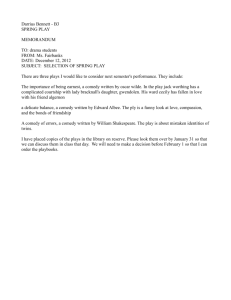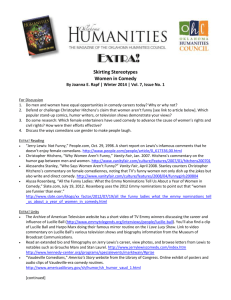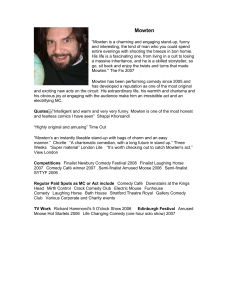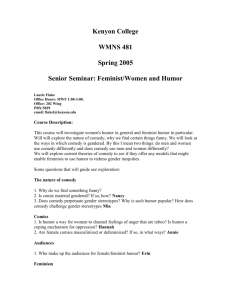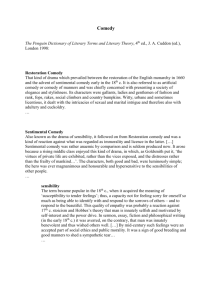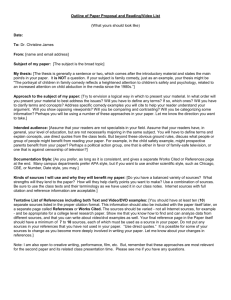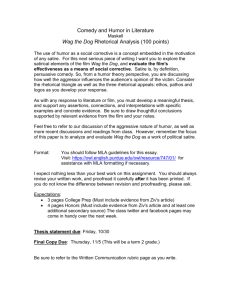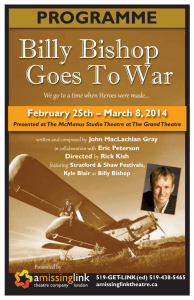lang comp research paper
advertisement
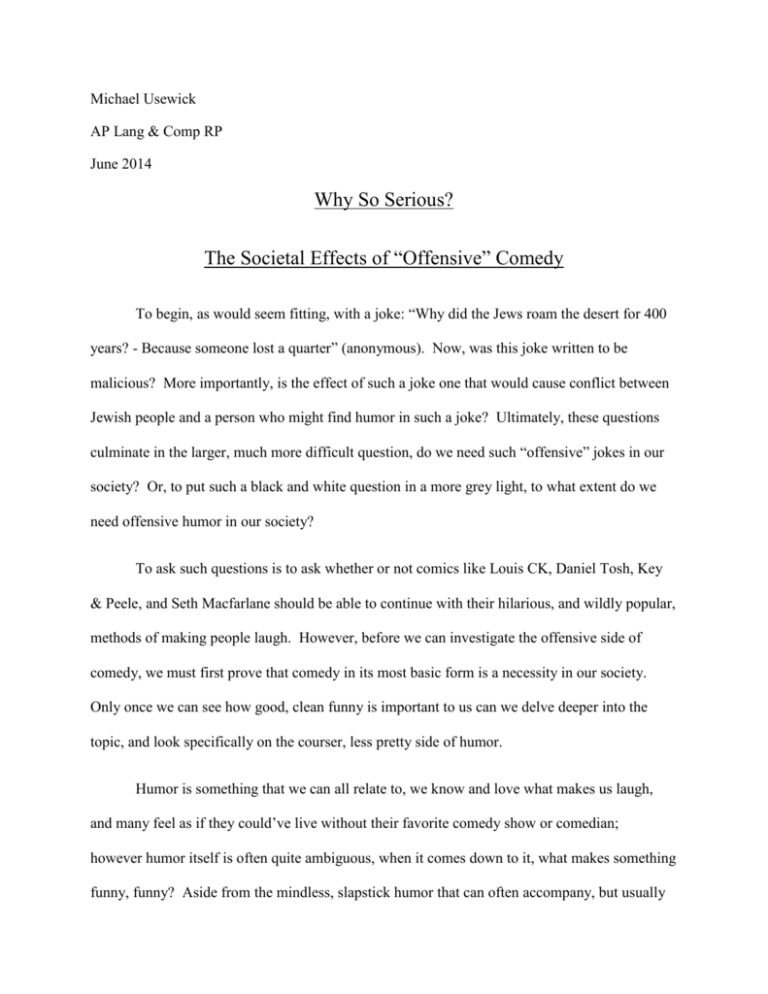
Michael Usewick AP Lang & Comp RP June 2014 Why So Serious? The Societal Effects of “Offensive” Comedy To begin, as would seem fitting, with a joke: “Why did the Jews roam the desert for 400 years? - Because someone lost a quarter” (anonymous). Now, was this joke written to be malicious? More importantly, is the effect of such a joke one that would cause conflict between Jewish people and a person who might find humor in such a joke? Ultimately, these questions culminate in the larger, much more difficult question, do we need such “offensive” jokes in our society? Or, to put such a black and white question in a more grey light, to what extent do we need offensive humor in our society? To ask such questions is to ask whether or not comics like Louis CK, Daniel Tosh, Key & Peele, and Seth Macfarlane should be able to continue with their hilarious, and wildly popular, methods of making people laugh. However, before we can investigate the offensive side of comedy, we must first prove that comedy in its most basic form is a necessity in our society. Only once we can see how good, clean funny is important to us can we delve deeper into the topic, and look specifically on the courser, less pretty side of humor. Humor is something that we can all relate to, we know and love what makes us laugh, and many feel as if they could’ve live without their favorite comedy show or comedian; however humor itself is often quite ambiguous, when it comes down to it, what makes something funny, funny? Aside from the mindless, slapstick humor that can often accompany, but usually doesn’t exclusively comprise great humor, something that makes us laugh tends to present something stressful to us in a way that is refreshingly more comfortable. Often times the funniest bits of comedy are situational, taking a stressful or scary situation, and lowering the stress, making that same situation we were once terrified of being in seem casual or even comfortable. This is essential in a world filled with unfairness and tragedy such as the one we live in. Making jokes about our fears allows us to take them on because it shows us that either there are much worse situations to be in than what we are worrying over, or that most fear and anxiety is pointless and will amount to nothing (Evans). In our society today, with the constant stress and anxiety faced by youth and adults alike, general humor is the most healthy, and the easiest way to take our fears and laugh in their faces, literally. As Keegan-Michael Kay and Jordan Peele put it, “…the true purpose of humor: to help people cope with the fears and horrors of the world,” something we could all use a little more of. If comedy is so important to our society, the question, then, is how far can comedians go before such beneficial comedy becomes destructive? This question becomes difficult, much more so than the question of humor in general, because of the span of humor that people might find offensive. In saying this I’m not referring to what makes individual people tick, but what might enrage one group of people (such as Asian people or African Americans, two quintessentially stereotyped groups according to yourdictionary.com), while being intended as a joke. In other words, how can something that enrages one group of people, be overall lowering the stress in a situation and therefore benefit society? Mary Hirsch, a humorist once said “Humor is a rubber sword – it allows you to make a point without drawing blood.” This quote generalizes the argument for endorsing racial and sexist comedy (two types of comedy often identified as offensive) in a very concise manner. Hirsch is pointing out how humor allows humorists to use harmless and generally accepted forms of media to provide a “rich layer of social commentary” on a topic of their choosing. Humorists, often through stand-up comedy, are able to push social boundaries that most people under normal circumstances would be unwilling to approach. Whether these boundaries be sexist conversations, commentary on racism and racial differences, or more tangible issues such as rape or tragedy, humor is a perfect way to bring to light or discuss these topics most would shy away from (Cohen, Richards). On a side note, though comedians and their material might end up sparking a much larger conversation in society (I.E. Stephen Colbert’s foundation fiasco), the majority of humorists do not set out to do so. As stated by Stephen Rosenfield, founder and director of the American Comedy Institute, “A Comedian’s first concern is to find funny material. That is his job.” This suggests that, while comedians may be making seemingly crude jokes about American racism towards Middle Eastern nations which spark a nation-wide, very serious, conversation on twitter, the only reason the jokes were made in the first place was to get a laugh out of a few audience members (Rosenfield). Another benefit of such controversial comedy, is removing the overwhelming sense of political correctness in our society. Though this might seem like a problem, comedy’s simple nature of taking the sting out of all things which have a negative connotation to us, including racism and stereotype, is extremely effective at diffusing tensions and getting important conversations started in society (Key, Peele). While we might all have certain stereotypes ingrained into our person (which is another topic for another research paper), laughing about exaggerated versions of these same stereotypes can actually lessen our bias against whatever race, religion, or personality we might think negatively about (Cohen, Richards). On the other end of the spectrum, there is poetry and other, more serious ways of discussing topics such as racism. Poetry written about racism tends to be much darker, instilling in us anger, an emotion which almost always is met with negative results in society. For example, the poem Reverse Racism, by George Craddock has a line reading “Racist evil deeds sow hate bigotry dark seeds.” After simply reading through the remainder of the poem (which I invite you to try), I am a little frightened, and can easily see (through SOAPSTone) that Craddock is attempting, through use of dark, staccato language, to inspire and enrage his audience, make a solemn call for action among his peers. This kind of action is certainly not needed in our society, and would bring about nothing but more hate. Craddock has attempted to do what a comedian could achieve while making his audience laugh in a bar somewhere. Up to this point, this paper has focused entirely on how beneficial offensive and controversial comedy is to our society. There does exist, however, a line which should not be crossed by humorists. This line is often referred to in conversation, when a person makes a joke that is met with the response “too soon.” Humorists can and should make cracks about social issues that need to be discussed in society, no matter how taboo the discussion might be, but making tasteless jokes immediately after a disaster in which major amounts of human, or nonhuman life was lost seems to cross some sort of unspoken line. Humorist Artie Lange said in an interview with the Huffington Post that “We live in a more enlightened time,” meaning the majority of people can tell if a comic is causing public outrage for a good reason, or those who are “offensive out of ignorance or blind hatred” (Hesse). This means that comedians must be more careful with how they structure their material, or else they might risk dangerously ruining their careers. A perfect example of how not to use offensive-type humor is seen in Anthony Jeselnik’s tweet “There are some lines that just shouldn’t be crossed today. Especially the finish line,” tweeted the day after the Boston Bombing. This is the perfect combination of bad timing and tastelessness which landed Jeselnik in a position of hatred, being quickly forgotten and rarely mentioned again. On the other hand, wildly popular comic, Louis CK is consistently able to use comedy that should be offensive, and get away with it. Perhaps some of his most dangerously edgy humor comes from his bits on slavery, when he mentions how terrible slavery was, but remarks “There’s no end to what you can do when you don’t give a fuck about a particular people.” How is CK able to get away with this time and time again? Mainly due to the way he always follows such tasteless comedy up with a point that leaves his audience thinking, such as “That’s where human greatness comes from – fucking others over.” This tiny line, tacked on at the end of a bit is able to spare CK any anger from the public by giving them a very intellectually based point to think on, why so many great human accomplishments have been built on the backs of slave labor or at the expense of another group of humans (Hesse)(Stanley). Ironically, the solution in times of disaster, instead of comedy, is poetry and other forms of writing. Poets, while generally unable to instill societal conversation without unnecessary negative emotion, are able to beautifully calm and put at ease tensions surrounding disaster that comedy would only stir up. Maurice Blanchot writes, in The Writing of the Disaster “It is not you who will speak: let the disaster speak in you,” a surprisingly powerful line, along with a surprisingly powerful poem which allows readers to more easily discuss and get through whatever disaster may have struck (Cooley). All forms and occasions considered, it is obvious that humor in general is needed in society, whether the intention is for the relieving of social tensions, or to help a person achieve a difficult goal. The power of offensive humor should certainly not be overlooked in our society as well, with the power to reduce the “sting” of stereotypes and forms of racism, and its ability to spark social conversation about difficult or taboo topics, better than any other method available in the media today. On the other hand, comedy does not belong in the wake of disastrous occurrences, unless there is an insightful comment placed strategically within the joke (I.E. Louis CK). Through this research, I have gained a new lens with which I can view comedy and comedians, so next time you sit down to watch an episode of Family Guy or a stand-up routine, try and see the joke from a societal standpoint, you might be startled by what you find. Works Cited Nonfiction Sources: Cohen, Roger, and Ryan Richards. "When the Truth Hurts, Tell a Joke: Why America Needs Its Comedians." Humanity In Action. Humanity In Action, n.d. Web. 14 June 2014. Evans, Jacob. "Why We Still Need Comedy | ASU News | The State Press | Arizona State University." TheStatePress.com. The State Press, 28 Jan. 2013. Web. 14 June 2014. Hesse, Josiah. "Anthony Jeselnik, Louis CK, and the Shifting Definition of "Offensive" Comedy | Splitsider." Splitsider. N.p., 13 Nov. 2013. Web. 14 June 2014. <http://splitsider.com/2013/11/anthony-jeselnik-louis-ck-and-the-shifting-definition-ofoffensive-comedy>. Key, Keegan-Michael, and Jordan Peele. "Make Fun of Everything." Time.com. Time, 13 Mar. 2014. Web. 14 June 2014. Rosenfield, Stephen. "The Art and Craft of Comedy." American Comedy Institute. Americancomedyinstitute.com, n.d. Web. 16 June 2014. <http://www.comedyinstitute.com/stevescomedytips.html>. Stanley, Alessandra. "This Way Back to His Discomfort Zone." The New York Times. The New York Times, 04 May 2014. Web. 16 June 2014. <http://www.nytimes.com/2014/05/05/arts/television/louis-ck-returns-with-his-brand-ofdark-comedy.html?_r=0>. Real-World Sources: "Funny Racial Jokes This Year." Kickass Humor. N.p., n.d. Web. 14 June 2014. <http://kickasshumor.com/c/10/funny-racial-jokes>. Hartsell, Carol. "Artie Lange Talks Using Gay Slurs And How Comedy Has Evolved." The Huffington Post. TheHuffingtonPost.com, 11 Nov. 2013. Web. 16 June 2014. <http://www.huffingtonpost.com/2013/11/11/artie-lange-gay-slurs_n_4255898.html>. Poets: Cooley, Nicole. "Poetry of Disaster." Poets.org. Academy of American Poets, n.d. Web. 16 June 2014. <http://www.poets.org/poetsorg/text/poetry-disaster>. Craddock, George. "POEM: REVERSE RACISM BY TERENCE GEORGE CRADDOCK (SPECTRAL IMAGES AND IMAGES OF LIGHT)."Poemhunter.com. Poemhunter.com, n.d. Web. 16 June 2014. <http://www.poemhunter.com/poem/reverseracism>.
